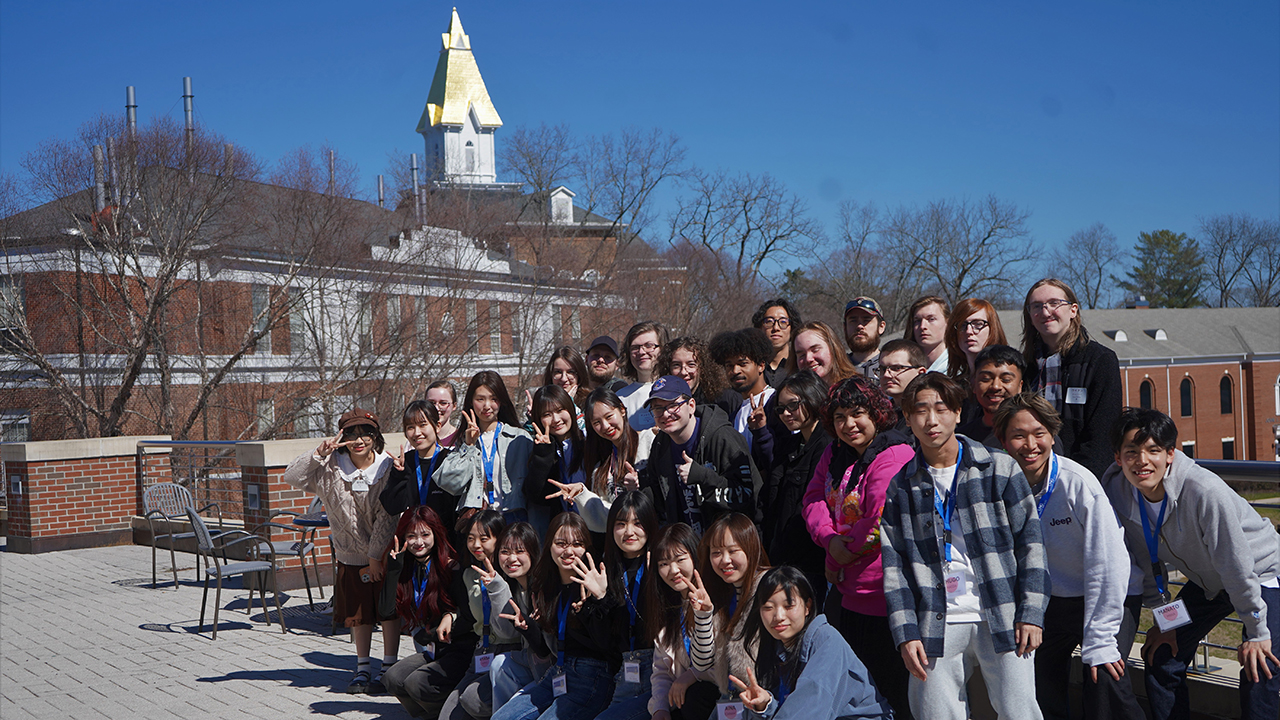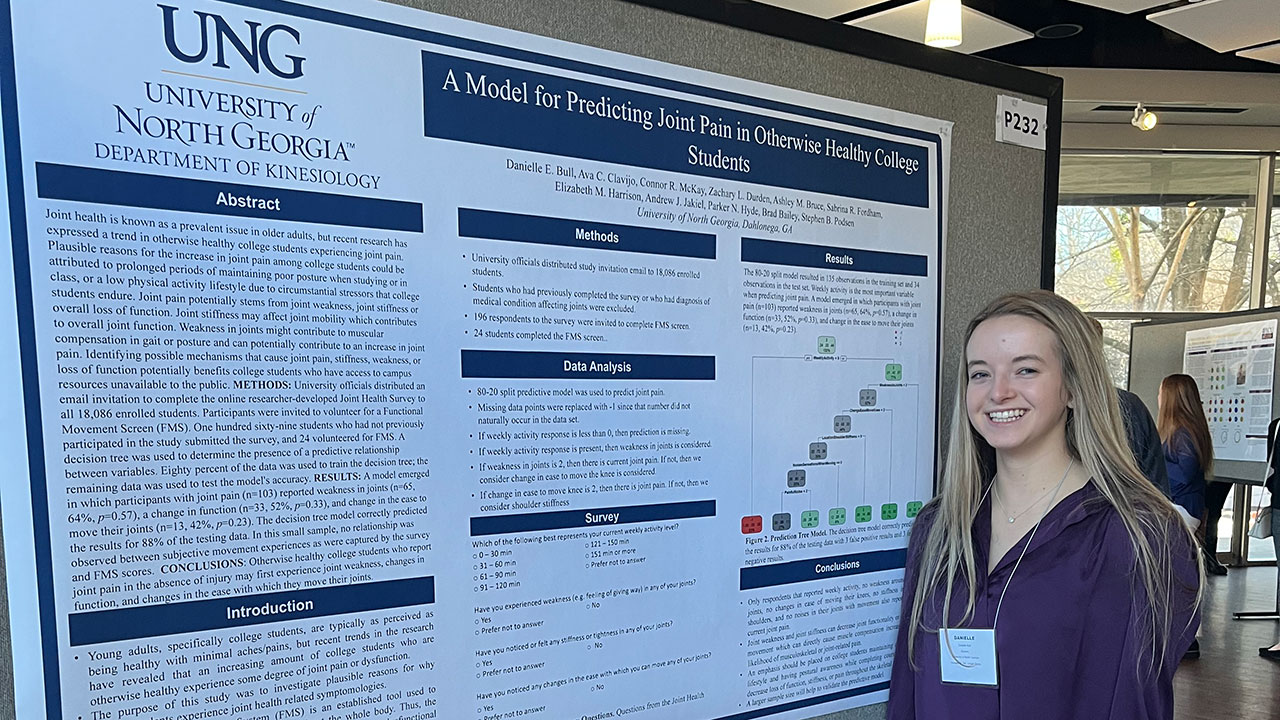CURCA mini-grants fund various undergraduate research projects

Article By: Staff
Searching for snakes with fungal diseases in Smithgall Woods State Park, investigating the effect cigarette smoke has on bladder cancer, and figuring out if a virus can kill bacteria are a few of the projects awarded mini-grants from the University of North Georgia (UNG) Center for Undergraduate Research and Creative Activities (CURCA).
Ten UNG faculty members received the mini-grant funds in late fall 2018. The grants offer up to $3,000 to fund supplies, travel to conduct research, or sometimes even specialized student assistance to faculty beginning or continuing undergraduate research projects in all academic areas. The mini-grants are reviewed and selected internally by a cross-disciplinary and cross-campus group of faculty members.
"By providing additional funding, CURCA mini-grants can help faculty move forward their own research while assisting students in getting more hands-on undergraduate research experience," said Dr. Anastasia Lin, assistant vice president of research and engagement at UNG. "Our grant winners and their students go on to present or publish the research completed with the help of these funds. And we think of these grants as potentially precursors to other larger external grants."
Jessica Patterson, lecturer of biology at UNG, will use the funds to help with her research on fungal diseases in snakes in the northeast Georgia region.
The Snake Fungal Disease causes sores to form on a snake's body, leading it to swell. The snake's immune system is suppressed and creates a 50 percent mortality rate in snakes contracting the disease, she said.
"The disease is caused by a naturally occurring fungal pathogen on the forest floor, but we don't know why it is occurring," Patterson said. "We want to figure out where it is and why it is happening."
 |
|
Jessica Patterson, lecturer of biology at the University of North Georgia, and her students will continue to survey snakes in Smithgall Woods State Park in Helen for the Snake Fungal Disease. |
To accomplish that, she and her students have been and will continue to survey snakes in Smithgall Woods State Park in Helen, swab them for samples and collect data such as their length and weight. The snakes are then released.
Samples from the snakes are shipped to a lab in Illinois to determine if they have the disease. The money will be used for supplies and sample analysis, Patterson said.
The field work and tests will help determine the location of the disease and hopefully lead to an answer, which is important to all.
"Each animal plays a role in the food chain," Patterson said. "Snakes eat insects and small rodents. If snakes die, then the insects and small mammals will take over. No one wants insects and rats all over."
Patterson is not the only faculty member conducting research related to insects and diseases. Dr. Davison Sangweme and Dr. Evan Lampert will conduct a molecular diagnosis of "Wolbachia" infections in insects.
"We will learn about the prevalence of symbiotic bacteria Wolbachia in local mosquito populations and other insects," said Sangweme, assistant professor of biology at UNG. "Wolbachia may offer insights into how we can help control disease vectors harboring pathogens such as Zika, Dengue, Chikungunya and West Nile viruses."
The unique addition is the UNG faculty and their students will enlist the help of children involved in Super Science Kids (SSK), whose mission is to teach and engage at-risk children and youth in shelters and foster care into the field of science. Angelica Krubeck, a 12-year-old middle school student, founded SSK and spoke in front of the biology faculty this semester.
"Angelica and our undergraduate students will assemble kits and train the SSK children on how to collect insects," said Lampert, associate professor of biology at UNG. "We will have pictures and illustrations on what insects to collect and ones to avoid. The collected insects will be preserved in the provided vials. "We hope to capture the SSK children's interest by sharing with them how widespread and common Wolbachia infections can be.""
Both faculty members acknowledge this community-based project will reveal if participation in research improves children's understanding of and their interest in science.
"We wish to capture and fire up interest in science at the earliest opportunity," Sangweme said.
Other faculty awarded mini-grants from CURCA are:
- William Balco, assistant professor of anthropology, geophysical and archaeological investigation of the Rice Farm site
- Heather Foster, limited term faculty of visual arts, ecologically themed painting for UNG Gainesville Campus Sciences, Engineering and Technology Building atrium
- Sarah Young, assistant professor of political science, Breaking the mold: An exploratory analysis of the characteristics of policy entrepreneurs
- Alison Kanak, assistant professor of biology, Functional characterization and genomic evaluation of novel Mycobacterium bacteriophage
- Shannon Kispert, assistant professor of biology, Cigarette Smoke-Induced Bladder Tumorigenesis and Progression via Pigment Epithelium-Derived Factor Downregulation by Phospholipase A2 Pathways
- Esther Morgan-Ellis, assistant professor of music, Database of American Sing-Along Repertoire, 1913-1964
- Paula Seffens, assistant professor of kinesiology, Yoga Exergame Development: Interactive Physical Activity for Older Adults



